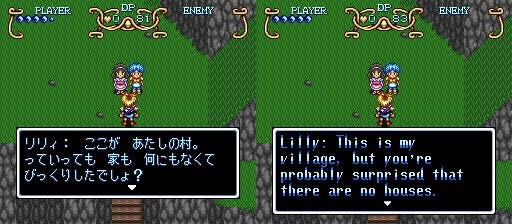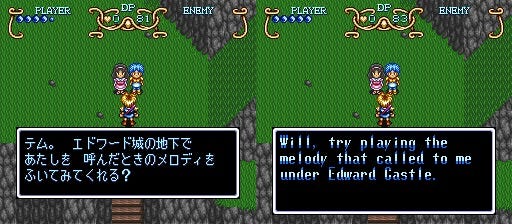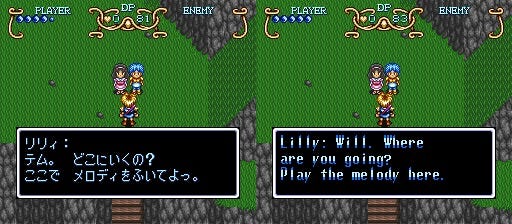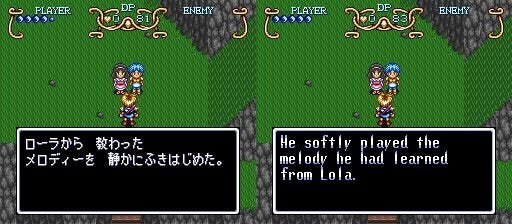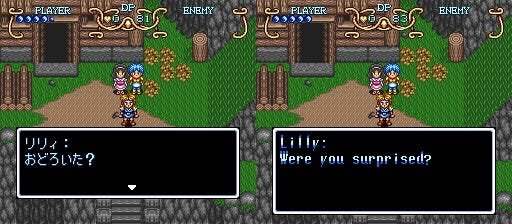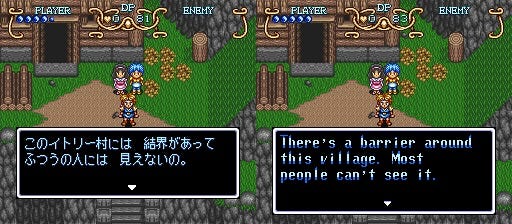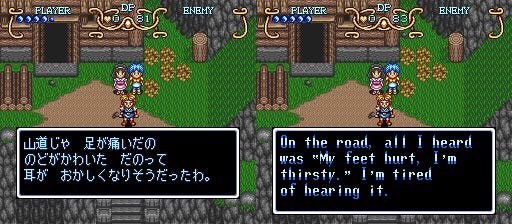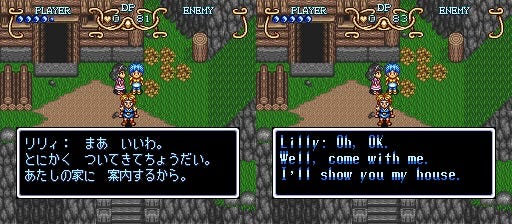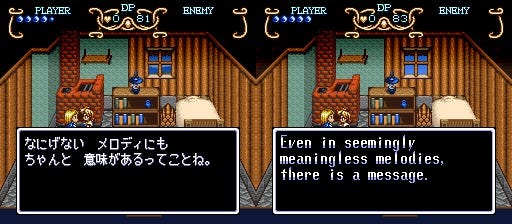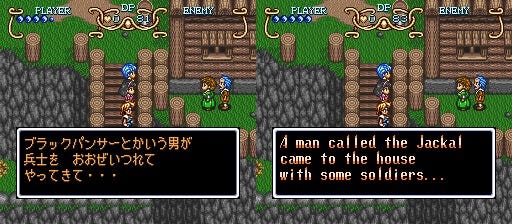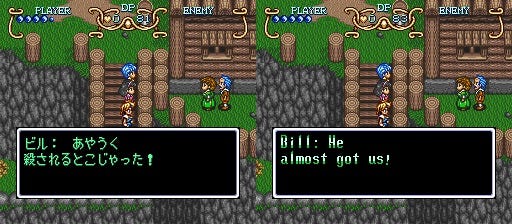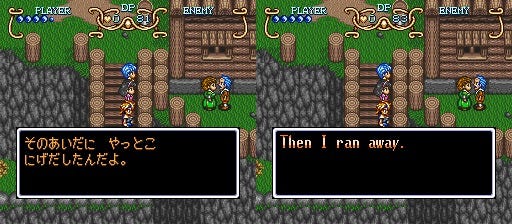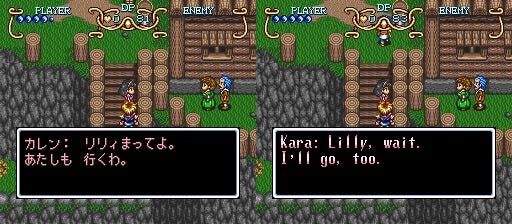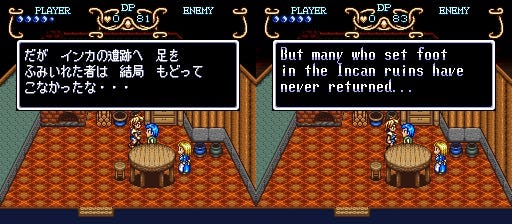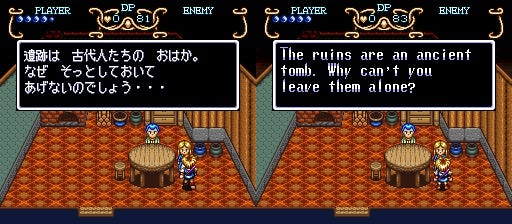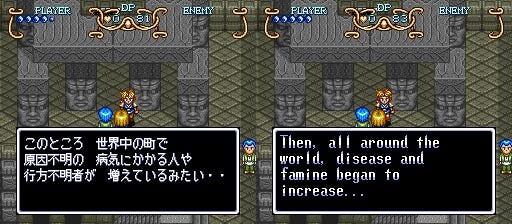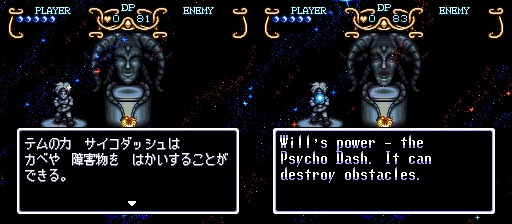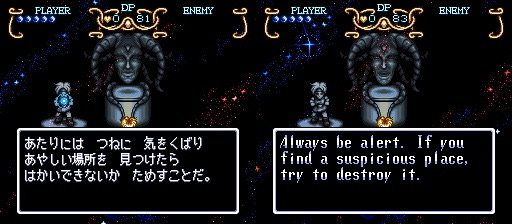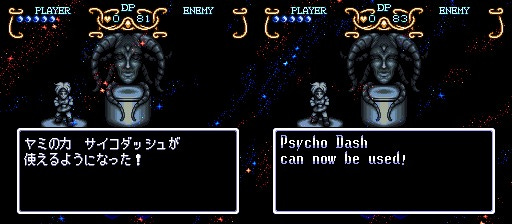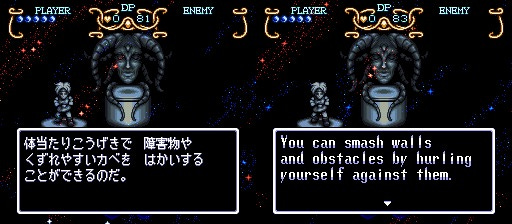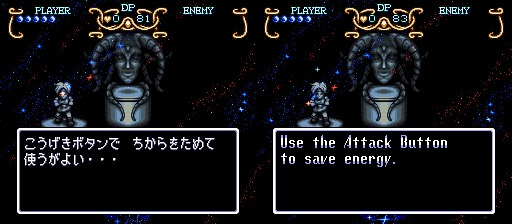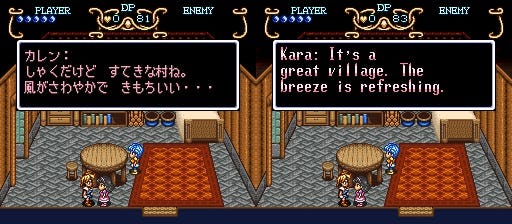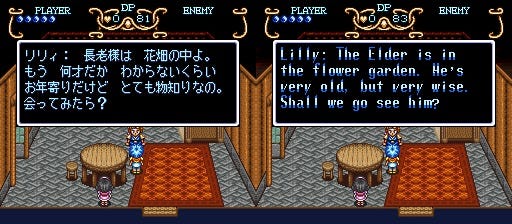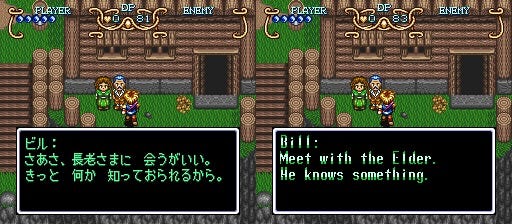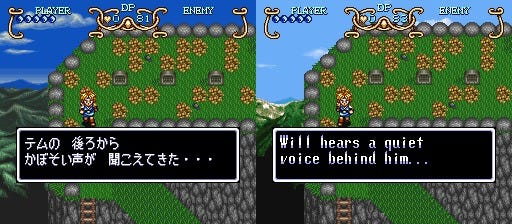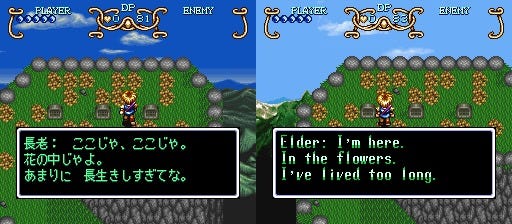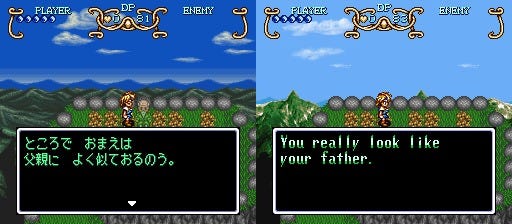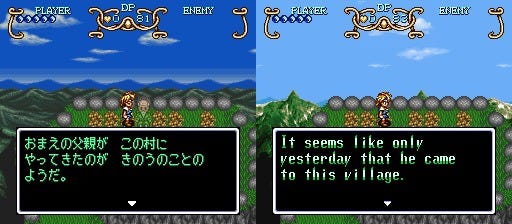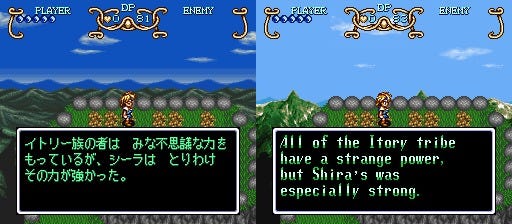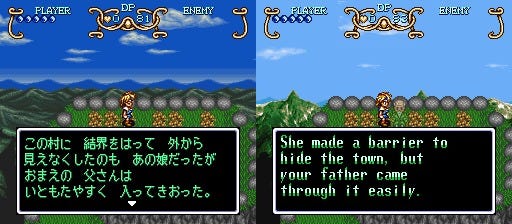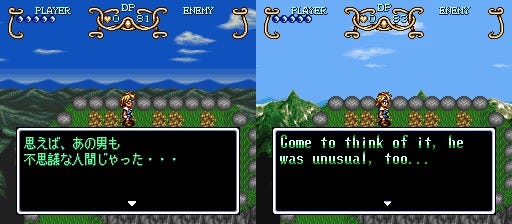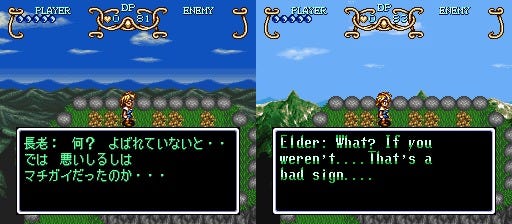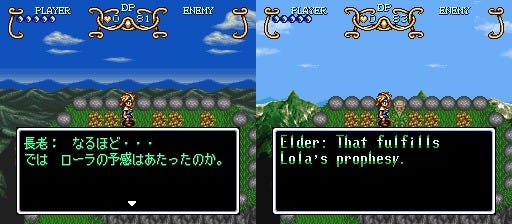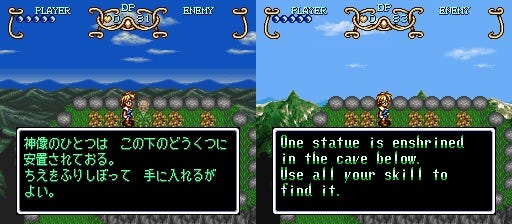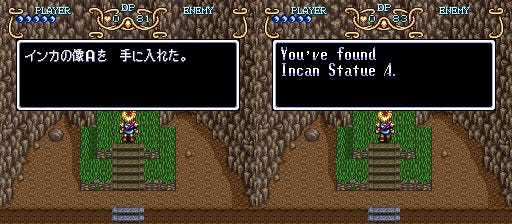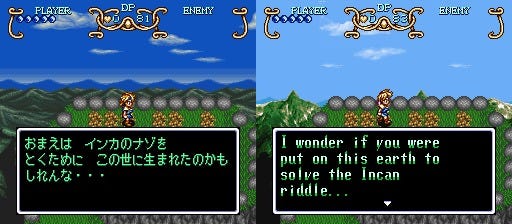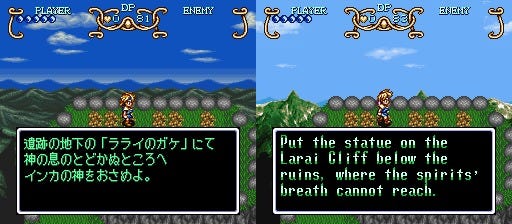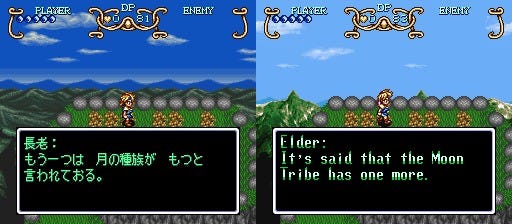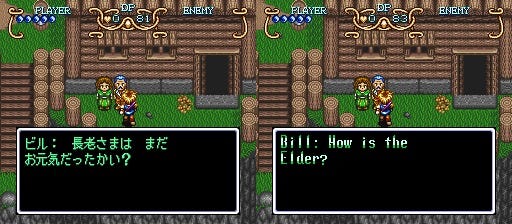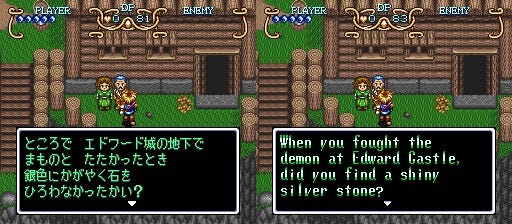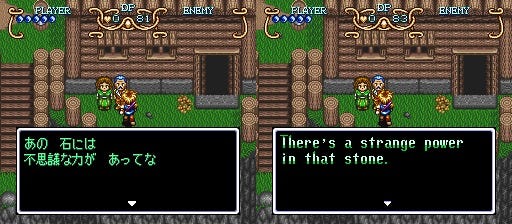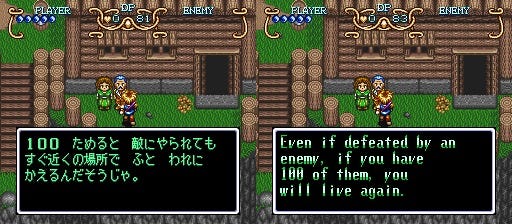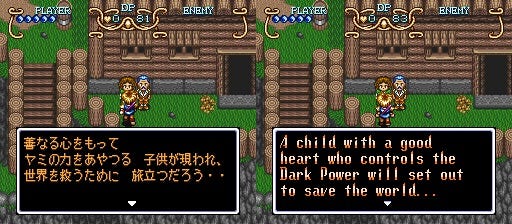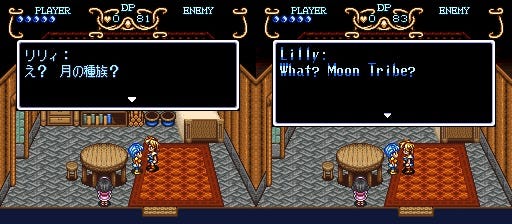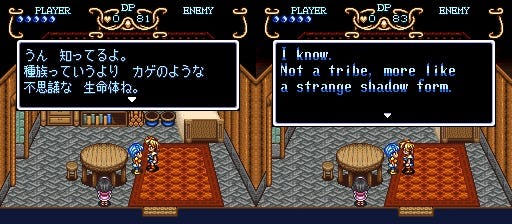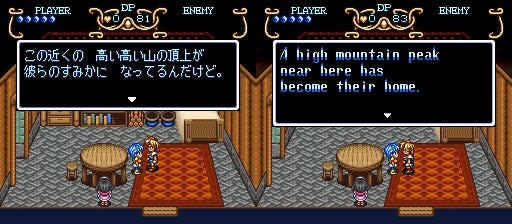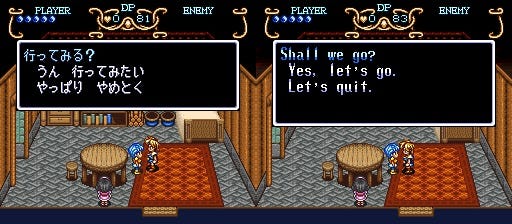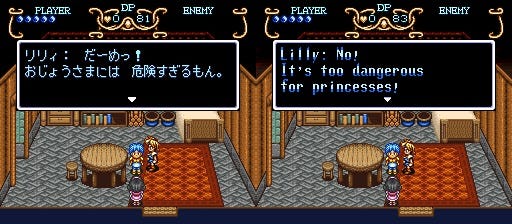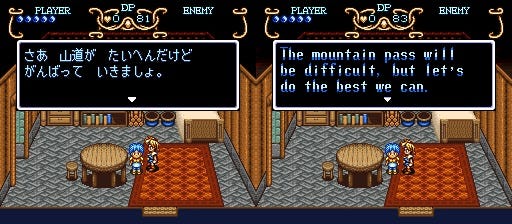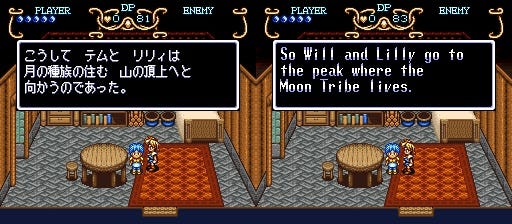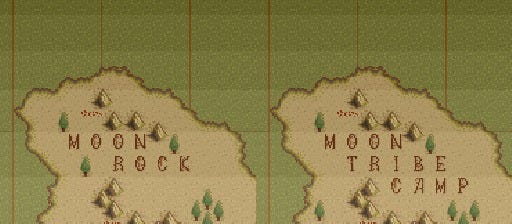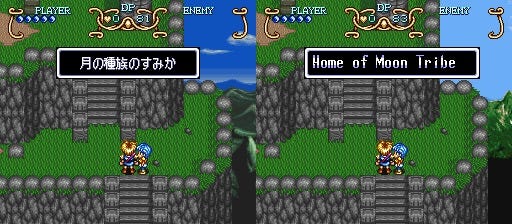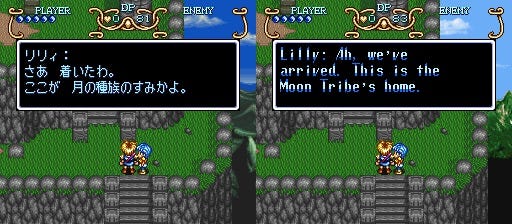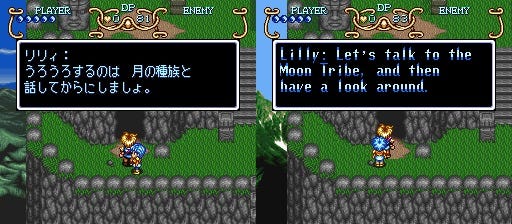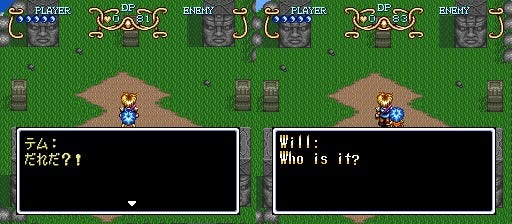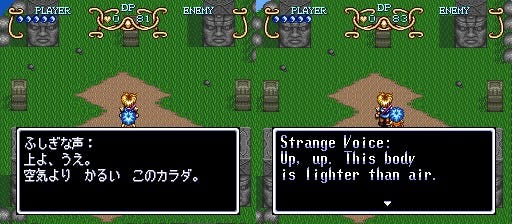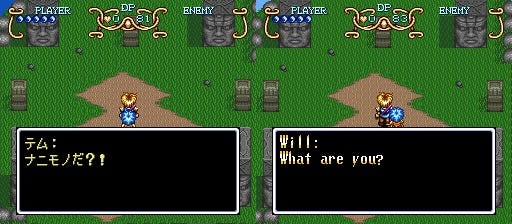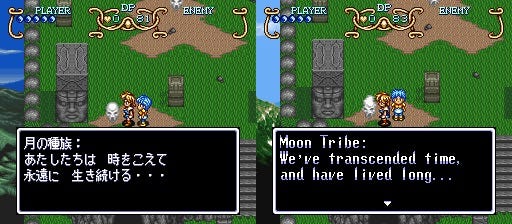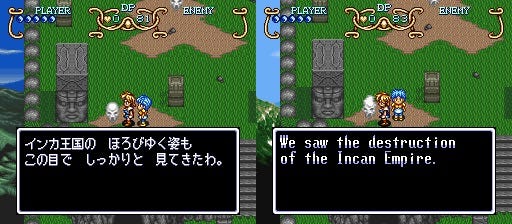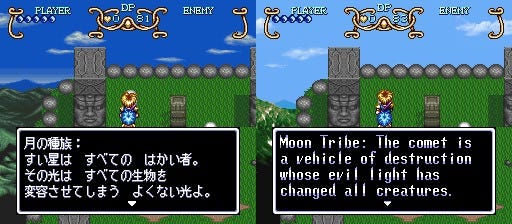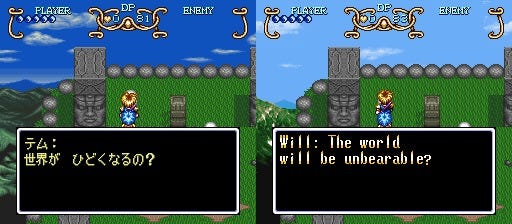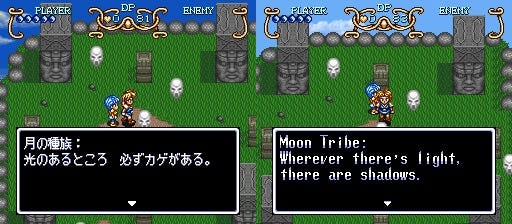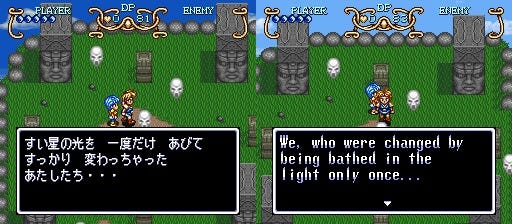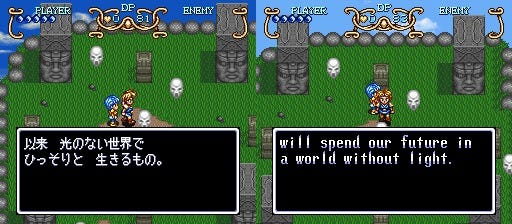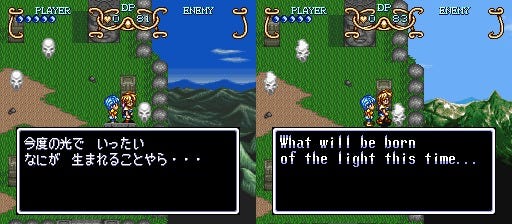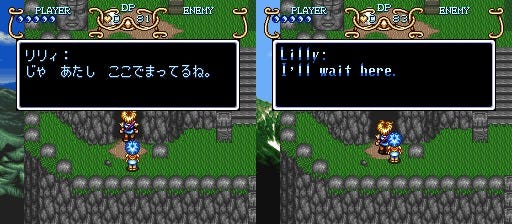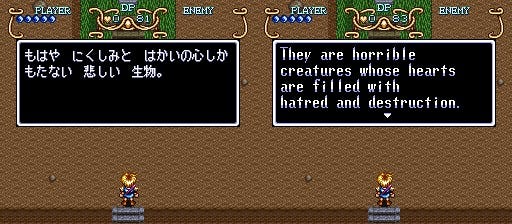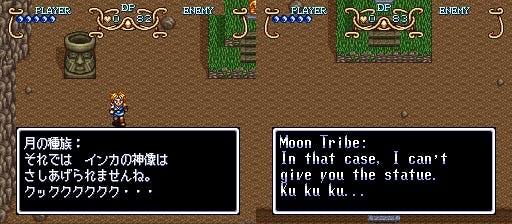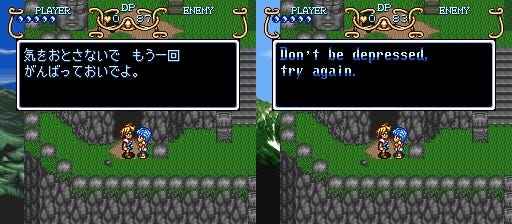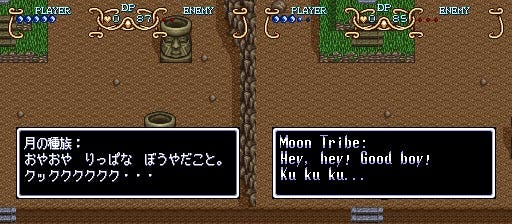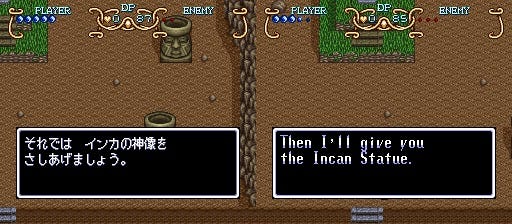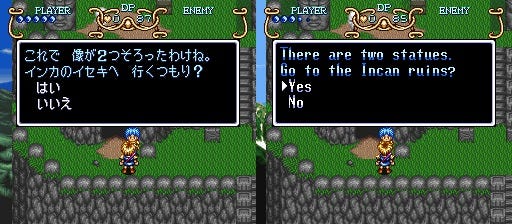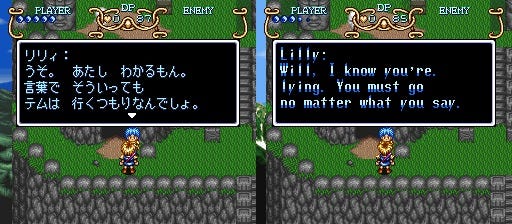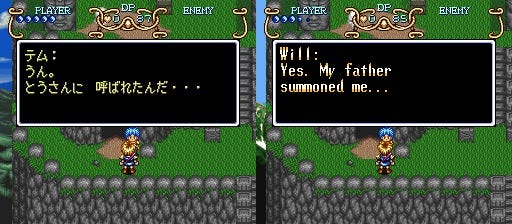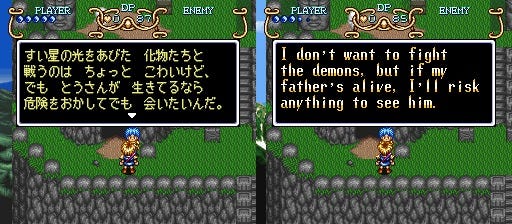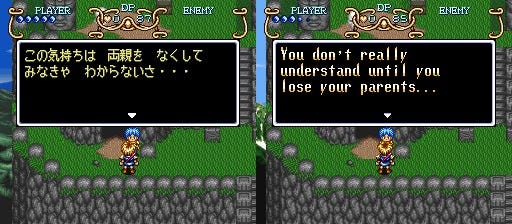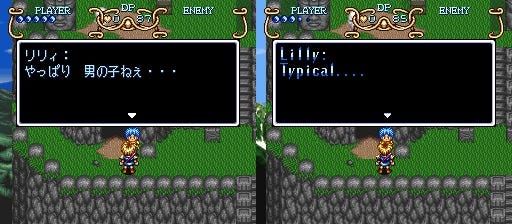Illusion of Gaia Translation Commentary Part 9: Itory Village and Moon Tribe
Did you also miss these Soul Blazer references, or am I just slow?
Disclaimers:
I’m an amateur. My advantage over the original translation is that I have no deadline pressure, and I have the modern internet to help me. I’m assuredly wrong about some of my translations.
Translation is hard. When I point out a mistranslation, it’s not a judgment of the original translator(s). They had a deadline and poor resources.
Some of my translations are rather liberal. I’ll usually make note if so.
Please no jokes in the comments about anyone being a Karen. I really hate that trend.
Notation reminder
JP: Original Japanese
T: My translation
OE: Original English
We’ve made it to Itory Village. This is the game’s second town.
JP: イトリー族の村
T + OE: Itory Village
It says Village of the Itory Tribe/Clan. On the Mode 7 world map, it says Itory Village.
JP: リリィ: ここが あたしの村。 っていっても 家も 何にもなくて びっくりしたでしょ?
テム。 エドワード城の地下で あたしを 呼んだときのメロディを ふいてみてくれる?
T: Lily: This is my village. I imagine you’re surprised to hear me say that, considering there are no houses or anything?
Tim. When we were under Edward Castle, you called out to me with a melody. Can you play it and see what happens?
OE: Lilly: This is my village, but you’re probably surprised that there are no houses.
Will, try playing the melody that called to me under Edward Castle.
If you do anything other than play the melody, the game won’t let you:
JP: リリィ: テム。 どこにいくの? ここで メロディをふいてよっ。
T: Where are you going, Tim? Play the melody right here.
OE: Lilly: Will. Where are you going? Play the melody here.
JP: ローラから 教わった メロディーを 静かにふきはじめた。
メロディーは 風にのって 草原中に ひろがっていった。
T: Tim began to quietly play the melody he learned from Laura.
The wind carried the melody across the meadow.
OE: He softly played the melody he had learned from Lola.
The melody, carried on the wind, spread over the meadow.
JP: リリィ: おどろいた?
このイトリー村には 結界があって ふつうの人には 見えないの。
T: Surprised?
There’s a barrier around this village that prevents ordinary people from seeing it.
OE: Lilly: Were you surprised?
There’s a barrier around this village. Most people can’t see it.
JP: しかし おじょうさまにも 困ったものよねぇ...
山道じゃ 足が痛いだの のどがかわいた だのって 耳が おかしくなりそうだったわ。
T: However, I’m annoyed at the princess.
On the mountain road she was all like, “My feet hurt!” and “I’m thirsty!” It was driving me crazy.
OE: The princess is getting to be a bother….
On the road, all I heard was “My feet hurt, I’m thirsty.” I’m tired of hearing it.
Well I’m annoyed at Lily’s constant unprovoked attacks on Karen. I’m not sure if this character was supposed to come off as a jerk, or if it’s just a different perspective I have as an American adult, but to me Lily’s a bully. If someone is complaining too much, there are nice ways to tell them to dial it back, for cryin’ out loud!
JP: カレン: しょうがないでしょ。 本当に 足が痛かったんだから。
リリィ: まあ いいわ。 とにかく ついてきてちょうだい。 あたしの家に 案内するから。
T: Karen: Well, what am I supposed to do? My feet actually hurt.
Lily: Ugh, ok. At any rate, please come with me. I’ll show you to my house.
OE: Kara: I can’t help it. My feet hurt.
Lilly: Oh, OK. Well, come with me. I’ll show you my house.
The OE says Oh, OK. I think this is a funny translation, because it sounds like of like Lily is saying: Oh, in THAT case, let me help you out. It’s more like, Oh, for crying out loud, fine.
There’s a red jewel in the logs immediately to the left, and a woman in the nearby house:
JP: かつて この地に 住んでいた インカ人たちは 文字というものを もたない 民族だったわ。
T: Once, the Incan people lived in this land. They didn’t have any kind of writing system.
OE: The Incas who lived here were a tribe without a written language.
JP: 彼らの いいつたえは 音という形で のこっているの。
なにげない メロディにも ちゃんと 意味があるってことね。
T: Their legends remain only in songs.
It’s said that there are deep meanings even in the casual melodies passed down.
OE: Their legends are left in song.
Even in seemingly meaningless melodies, there is a message.
There’s a woman next to the stairs that Lily and Karen are standing on:
JP: この村には リリィと 同い年 くらいの子が いないのよ。 なかよくしてやってね。
T: There are no children in this village close to the same age as Lily. Please become good friends with her.
OE: There are no other children Lilly’s age in the village. Please become friends.
JP: ローラ: テム! テム! こっちよ!
ビル: 無事だったのか、 よかった よかった...
T: Laura: Tim! Tim! Over here!
Bill: You’re ok? Good, good.
OE: Lola: Will! Will! Over here!
Bill: You’re safe. Good… good…
JP: ローラ: あたしたち とても こわい目に あったのよ!
T: Laura: We had a very frightening time!
OE: Lola: A terrible thing happened to us!
JP: ブラックパンサーとかいう男が 兵士を おおぜいつれて やってきて...
ビル: あやうく 殺されるとこじゃった!
T: A man called Black Panther or something like that came, leading a big crowd of soldiers.
Bill: We were almost killed!
OE: A man called the Jackal came to the house with some soldiers…
Bill: He almost got us!
JP: ローラ: おじいさんったら オタオタしちゃって。
あたしの 毒リンゴパイで 兵士たちの オナカをこわして やったのさ。
T: Your grandpa, here, panicked.
But I gave the soldiers indigestion with my poisoned apple pie.
OE: Lola: Grandpa panicked.
I destroyed their digestion with a poisoned marsupial pie.
All accurate, except that once again the OE changes Lola’s cooking to be even more bizarre than it is in the original.
JP: そのあいだに やっとこ にげだしたんだよ。
T: We barely made it out in that moment.
OE: Then I ran away.
JP: ローラ: そうそう。 リリィ、ご苦労様でした。 それに カレンひめさま まで ごいっしょとは。
T: Laura: That reminds me. Lily, thank you so much. And look at that, even Princess Karen came along!
OE: Lola: Lilly, thank you. I didn’t know that Princess Kara came, too.
JP: リリィ: だってさあ 勝手についてくるんだもん。
テム。 この家が あたしの家なの。 村を 見物したければしてもいいけど あとで ここへ もどってきてね。
T: Lily: Ugh, yeah, ‘cause she just HAD to come along.
Tim, this house is mine. If you wanted to do some sightseeing around the village, that’s fine, but come back here afterwards.
OE: Lilly: We didn’t ask her to come along.
Will. This is my house. You can look around the village, but then come back here.
JP: カレン: リリィまってよ。 あたしも 行くわ。
T: Karen: Lily, wait up. I’m going too.
OE: Kara: Lilly, wait. I’ll go, too.
Man in a nearby house:
JP: 多くの人々が インカの黄金を求めて この地へ やってきたよ。
だが インカの遺跡へ 足を ふみいれた者は 結局 もどって こなかったな...
T: Many people have come to this land seeking the Incan gold.
But those who set foot in the Incan ruins never came back.
OE: Many people have come here to gather Incan gold.
But many who set foot in the Incan ruins have never returned…
It’s not many who set foot never return. It’s people. Presumably all of them.
And the woman next to him:
JP: 遺跡は 古代人たちの おはか。 なぜ そっとしておいて あげないのでしょう...
T: The ruins are the tomb of the ancients. Won’t you please leave them alone?
OE: The ruins are an ancient tomb. Why can’t you leave them alone?
Above Lily’s house, there’s a big stone structure.
JP: ここは その むかし 世界が ほろびかけたとき 救世主が あらわれた場所と いわれています。
T: It’s said that this is the place where the savior appeared, when the world was nearing destruction a long time ago.
OE: It’s said that a messenger appeared here when the ancient world was about to be destroyed.
I wonder if they censored savior because they thought it would be offensive to Christians? 救世主 (kyuuseishu) means savior or Messiah.
Anyway, I didn’t understand what this was about at all, until I was retranslating this game as an adult. This is a Soul Blazer reference. I did a facepalm when I finally realized it. You see…
…Itory Village is Grass Valley. The stone monument in the northeast corresponds to the house with the evil painting. Lily’s house corresponds to Lisa’s house. The river has cut through the mountain completely so there’s a gorge dividing each half. And the cave on the left side where you find the first Incan Statue corresponds to the entrance of the Underground Castle.
You could say it’s coincidence, if it weren’t for the guy talking about this being where the savior appeared and saved the world a long time ago. I think it’s all intentional.
Something that doesn’t help matters is a mistranslation of the woman standing immediately next to him.
JP: このところ 世界中の町で 原因不明の 病気にかかる人や 行方不明者が 増えているみたい..
この星が いつまでも 平和で ありますように。
T: Recently, in towns around the world, it seems like more people are suffering from an unknown illness or going missing.
I hope there can be peace on this planet forevermore.
OE: Then, all around the world, disease and famine began to increase…
This planet had always been peaceful.
Growing up, I thought she was continuing the thought of the previous man, about the world being nearly destroyed a long time ago. She’s not. She doesn’t say then as in back then, but このところ (konotokoro) which means these days or recently. And no verb in either sentence is in past tense.
In the Dark Space, there’s a statue of Tim. Gaia will give some new advice:
JP: テムの力 サイコダッシュは カベや 障害物を はかいすることが できる。
T: Tim’s power Psycho Dash can destroy walls and obstacles.
OE: Will’s power - the Psycho Dash. It can destroy obstacles.
JP: あたりには つねに 気をくばり あやしい場所を 見つけたら はかいできないか ためすことだ
T: Always pay attention to your surroundings. If you notice a suspicious spot, see if you can’t destroy it.
OE: Always be alert. If you find a suspicious place, try to destroy it.
This line got featured on Video Game Advisor because it’s funny out of context. But it’s not a mistranslation. That’s what it says! Attack random locations. Ram your face right into them.
JP: ヤミの力 サイコダッシュが 使えるようになった!
サイコダッシュは 少年テムだけが 使うことのできる ちから。
T: Gained the dark power Psycho Dash!
Only young Tim is able to use the Psycho Dash.
OE: Psycho Dash can now be used!
Only young Will can use the Psycho Dash.
JP: 体当たりこうげきで 障害物や くずれやすいカベを はかいする ことができるのだ。
こうげきボタンで ちからをためて 使うがよい...
T: Being a ramming attack, it can destroy certain objects and crumbling walls.
Hold the Attack button to store power.
OE: You can smash walls and obstacles by hurling yourself against them.
Use the Attack Button to save energy.
JP: そこの坂を かけおりて そのまま 走っていってごらん。 きっと びっくりするよ。
T: Try running down that hill over there. I’m sure you’ll be surprised.
OE: Try running down that hill, and keep running. You’ll be surprised.
Yeah, we’re not doing that yet. We have to squeeze some dialogue out of the main characters first.
JP: カレン: しゃくだけど すてきな村ね。 風がさわやかで きもちいい...
T: Karen: Despite the annoying climb, it’s a beautiful village, isn’t it? The cool breeze feels so good.
OE: Kara: It’s a great village. The breeze is refreshing.
しゃくだけど (shakudakedo) means although it’s annoying. She doesn’t say the climb is annoying specifically, but that’s what makes the most sense given that’s what she was complaining about before.
JP: リリィ:長老様は 花畑の中よ。 もう 何才だか わからないくらい お年寄りだけど とても物知りなの。 会ってみたら?
T: Lily: The Elder is in the flower garden. He’s so old that he’s forgotten his own age, but he’s extremely knowledgeable. Why don’t you meet with him?
OE: Lilly: The Elder is in the flower garden. He’s very old, but very wise. Shall we go see him?
OE keeps turning Lily’s recommendations to Tim into first person plural for some reason. Missing context, I guess.
JP: ビル: さあさ、長老さまに 会うがいい。 きっと 何か 知っておられるから。
T: Bill: It’s best you meet the Elder. Surely he knows something.
OE: Bill: Meet with the Elder. He knows something.
JP: ローラ: なんだか イヤな予感がするんですよ。
T: Laura: For some reason, I have a bad premonition.
OE: Lola: I’m afraid that something bad is going to happen.
OE seems fine here, and out of context it is. But this is actually going to come up again when we talk to the Elder, and without using the exact same words in both locations, the OE is just baffling. You’ll see what I mean shortly. Laura uses 予感 (yokan) - premonition, hunch.
If you jump over to the other side of town, you’ll find a field of flowers and some messages from nowhere.
JP: テムの 後ろから かぼそい声が 聞こえてきた...
不思議声: よくきた、テム...
T: Tim heard a feeble voice behind him.
Mysterious voice: I’m glad you came, Tim.
OE: Will hears a quiet voice behind him.
Strange voice: You’ve come, Will…
JP: 長老: ここじゃ、ここじゃ。 花の中じゃよ。 あまりに 長生きしすぎてな。
T: Elder: Over here. In the flowers. I’ve lived for too long.
OE: Elder: I’m here. In the flowers. I’ve lived too long.
I was kind of surprised this wasn’t a mistranslation. It’s such a random thing to say.
JP: 長老: こうやって 花の精 たちに 守ってもらわないと 生きておれんのじゃ。
T: Elder: If the flower spirits don’t protect me like this, I can’t live on.
OE: Elder: I can’t live without the protection of the Flower Spirit.
The Elder’s speech is old fashioned in various ways. One is found here, where he uses おる (oru) instead of いる (iru) - to exist. He says 生きておれん (ikiteoren) which in modern speech would be 生きていれない (ikiteirenai) - to not be able to continue living.
JP: ところで おまえは 父親に よく似ておるのう。
おまえの父親が この村に やってきたのが きのうのことの ようだ。
T: Incidentally, you look very much like your father.
It seems like just yesterday he came to this village.
OE: You really look like your father.
It seems like only yesterday that he came to this village.
JP: テム: とうさんが...
T: Tim: My father came here?
OE: Will: My father…
JP: 長老: おまえの かあさん..つまり おまえの祖父母 ビルとローラの 一人娘シーラはたいそうな美人でな。
おまえの父親は 一目ぼれして この村から うばっていって しまったのじゃ。
T: Elder: Your mother… in short, your grandparents Bill and Laura’s only daughter, Sheila, was a very beautiful woman.
Your father fell in love at first sight and snatched her away from this village.
OE: Elder: Your mother, Shira, was the only daughter of your grandparents, Bill and Lola.
She was very beautiful.
Your father fell in love with her and took her from the village.
The Elder is bitter about it. He uses an inflection of うばう (ubau) which means to snatch, steal, or take by force. I highly doubt Olman/Allman actually took her by force. I think it’s just the Elder’s perspective. He has more negative things to say later as well.
I can see an argument that ローラ (roora) could be Lola instead of Laura, but I draw the line at シーラ (sheera). It’s Sheila, not Shira. (Or She-ra.)
JP: イトリー族の者は みな不思議な力を もっているが、シーラは とりわけ その力が強かった。
T: Everyone in the Itory Tribe shares a mysterious power, but for Sheila, this power was especially strong.
OE: All of the Itory tribe have a strange power, but Shira’s was especially strong.
JP: この村に 結界をはって 外から 見えなくしたのも あの娘だったが おまえの 父さんは いともたやすく 入ってきおった。
T: She was even the one who put the barrier around the village that prevents it from being seen, but your father waltzed right in like it wasn’t there.
OE: She made a barrier to hide the town, but your father came through it easily.
He says 入ってきおった (haittekiotta) which my research said is an old-timey contraction of 入ってきやがった (haittekiyagatta). やがった after the masu-stem of a verb indicates hatred, contempt, disdain, often translated as have the nerve to X. I used waltzed right in which has a negative connotation of someone entering brazenly where they’re not wanted. I’m not sure it’s strong enough to indicate the Elder’s contempt.
JP: 思えば、あの男も 不思議な人間じゃった...
それで、おまえは 父に よばれたのじゃな?
>はい
>いいえ
T: Now that I think of it, he was quite mysterious as well.
Given that fact, are you here because you were summoned by your father?
>Yes
>No
OE: Come to think of it, he was unusual, too…
Were you summoned by your father?
>Yes
>No
I guess Tim’s magic powers are explained: He had a magic mom and dad. Simple. Anyway, the correct answer is yes, so of course we choose no first:
JP: 長老: 何? よばれていないと.. では 悪いしるしは マチガイだったのか...
T: Elder: What? You weren’t summoned? Then, was the ill omen I heard about simply a mistake? Hmm.
OE: Elder: What? If you weren’t…. That’s a bad sign….
Bit of a mistranslation in the OE. To the contrary, he’s saying that it might not be an ill omen. And what’s with this ill omen he’s talking about? We need to say yes to find out.
JP: 長老: なるほど... では ローラの予感はあたったのか。
で、ゆくつもりなのか?
>はい
>いいえ
T: Elder: Indeed. Then Laura’s premonition was on target. Hmm.
So, do you plan to go?
>Yes
>No
OE: Elder: That fulfills Lola’s prophesy.
Do you plan to go?
>Yes
>No
Fulfills Lola’s prophecy? What the f is he talking about? It’s easier to tease out in the original JP. He uses the word 予感 (yokan - premonition, hunch). Remember that word? Let’s rewind a bit:
Yeah, that. Remember, Laura is from Itory Village. This means that she has magical powers just like everyone else there. Presumably, some kind of disaster sense in her case. She told us earlier that she had a premonition. The Elder has heard about this premonition, and considers it confirmed if you tell him your father sent you, and disconfirmed if you say that he did not.
Now that’s explained, we can proceed to say no again when the obviously correct answer is yes.
JP: 長老: なんと。 父親に似ず おとなしい子じゃのう。
T: Elder: What? You’re a meek child, unlike your father.
OE: Elder: A disobedient son, unlike your father.
Yeah, OE is backwards again. We already established that the Elder thinks of Olman/Allman as a disobedient man, so OE can’t possibly be right. The trick is the Elder’s old-timey speech. He says 似ず (nizu). 似る (niru) means to resemble/look like/be like. If you wanted to negate this in modern JP, you’d say 似ない (ninai), but in older forms of the language you could say 似ず. He’s saying does not take after.
As for obedient vs. meek, おとなしい (otonashii) has many definitions. You have to choose the correct one through context.
Moving on:
JP: 長老: よかろう。 ならば おまえに この村に伝わる インカの神像をたくすことにしよう。
T: Elder: Very well. In that case, I will entrust you with the Incan idol that has been handed down in this village.
OE: Elder: Good. I will entrust you with the Incan Statue handed down to the village.
JP: インカの なぞをとく カギとなる 2体の神像... それらは 数百年の間 人の手に ふれておらぬ。
神像のひとつは この下のどうくつに 安置されておる。 ちえをふりしぼって 手に入れるが よい。
T: Two idols will be the key to solving the riddle of the Incas. No human hand has touched them for several hundred years.
One of the idols has been enshrined in the cave below. You will need to muster your wits to obtain it.
OE: The statues are the key to the Incan riddle—untouched by human hands for hundreds of years.
One statue is enshrined in the cave below. Use all your skill to find it.
By muster your wits or use your skill, the Elder means that Tim should ram his face into the cave wall using Psycho Dash. Behind that wall:
JP: インカの像Aを 手に入れた。
T: Got Incan statue A.
OE: You’ve found Incan Statue A.
JP: 長老: おおっ それこそ インカの神像! よくぞ 見つけ出した!
おまえは インカのナゾを とくために この世に生まれたのかも しれんな...
T: Elder: Oh! That’s the Incan idol for sure! How skillfully you found it!
Maybe you were brought into this world to solve the riddle of the Incas.
OE: Elder: Oooh, that’s the Incan Statue!! Good job!
I wonder if you were put on this earth to solve the Incan riddle…
Later, it turns out that Tim was actually brought into this world to transform it into the 1990s, using comet magic.
JP: では この村に伝わる 伝説を ひとつ おしえよう。
T: Then I’ll teach you the legend passed down in this village.
OE: I’ll tell you a legend handed down by our people.
JP: 遺跡の地下の「ラライのガケ」にて 神の息のとどかぬところへ インカの神をおさめよ。
谷風が その者を 黄金の船のもとへ 導くであろう。
T: At the underground ruins of the Larai Cliff, offer the Incan gods, in the place where the breath of the gods does not reach.
The valley wind will guide you to the location of the gold ship.
OE: Put the statue on the Larai Cliff below the ruins, where the spirits’ breath cannot reach.
The winds in the valley will lead you to the Gold Ship.
Minor censorship solves a part of the puzzle for you. The gods in question are the 2 statues. Not that it was exactly a brain buster.
JP: わかったかな?
>はい
>いいえ
T: Did you understand that?
>Yes
>No
OE: Understand?
If you choose no, he just repeats himself. Choosing yes instead:
JP: 長老: もうーつは 月の種族が もつと 言われておる。
そこへは リリィに 道案内 してもらうがよい。 気をつけてな。
T: Elder: It’s said that one more idol is held by the Moon Tribe.
You’d better have Lily guide you there. Be careful.
OE: Elder: It’s said that the Moon Tribe has one more.
Have Lilly guide you there. Be careful.
Before we talk to Lily, Bill and Laura have new dialogue.
JP: ビル: 長老さまは まだ お元気だったかい?
ところで エドワード城の地下で まものと たたかったとき 銀色にかがやく石を ひろわなかったかい?
T: Bill: Is the Elder still doing well?
After you defeated monsters underneath Edward Castle, did you find any shiny, silver stones?
OE: Bill: How is the Elder?
When you fought the demon at Edward Castle, did you find a shiny silver stone?
JP nonspecification of singular/plural strikes once again. And sometimes the demon word choice over monster sounds so wrong. Like, the heck demon did I fight at the castle? Bats? Bats aren’t demons, Bill!
(They aren’t monsters either, but these were really big bats.)
JP: あの 石には 不思議な力が あってな
100 ためると 敵にやられても すぐ近くの場所で ふと われに かえるんだそうじゃ。
T: That stone has some mysterious power.
After gathering 100 of them, even if defeated, one will suddenly find himself returned to a place nearby.
OE: There’s a strange power in that stone.
Even if defeated by an enemy, if you have 100 of them, you will live again.
JP: ローラ: この村には むかしから いい伝えがあってね、
善なる心をもって ヤミの力をあやつる 子供が現われ、 世界を救うために 旅立つだろう..
T: Laura: There’s a nice legend in this village, from long ago.
A child, holding a virtuous heart and a dark power, will appear and depart on a journey to save the world.
OE: Lola: There’s an old legend in this village.
A child with a good heart who controls the Dark Power will set out to save the world…
JP: その者が 現われるとき、 きょだいな すい星が 地のふちを かすめ 大いなるヤミの力が 復活するであろう...
これが イトリー族に伝わる 言葉なんだよ。
T: When that person appears, a huge comet will overshadow the edge of the earth, and the great dark power will be reborn.
These are the words of the Itory clan’s legend.
OE: At that time, a huge comet will enter Earth’s orbit, and a Dark Power will arise…
These are the words of the Itory legend.
We have to talk to Lily to progress the story:
JP: リリィ: え? 月の種族?
うん 知ってるよ。 種族っていうより カゲのような 不思議な 生命体ね。
T: Lily: Huh? The Moon Tribe?
Yeah, I know about them. They’re called a tribe, but they’re a strange, shade-like lifeform.
OE: Lilly: What? Moon Tribe?
I know. Not a tribe, more like a strange shadow form.
JP: この近くの 高い高い山の頂上が 彼らのすみかに なってるんだけど。
行ってみる?
>うんいってみたい
>やっぱり やめとく
T: They live at the summit of a tall, tall mountain near hear.
Shall we go?
>Yeah, let’s try.
>Actually, better not.
OE: A high mountain peak near here has become their home.
Shall we go?
>Yes, let’s go.
>Let’s quit.
If you decline you’re treated to some bizarre dialogue in OE:
JP: リリィ: そうね。 彼らを おこらすと 命がないって言うし。 やめといたほうが いいかもね。
T: Lily: Yeah, good call. I’ve heard that if you anger them, they’ll end your life. It might be better not to go.
OE: Lilly: If you make him mad, you’ll lose your life, so you’d better stop it.
彼 (kare): he. 彼ら (karera): they. Extremely easy mistake to make.
When you finally agree to go:
JP: リリィ: わかった。 じゃ 案内するね。
カレン: あたしも いくっ! 月の種族って 見てみたいわ。
T: Lily: Understood. Then I’ll lead the way.
Karen: I’m going too! I want to see the Moon Tribe.
OE: Lilly: OK. I’ll lead.
Kara: I’m going, too! I want to see the Moon Tribe.
JP: せっかく きゅうくつなお城を ぬけだせたんですもの。 何でも 見たり聞いたりしたいの。
T: This kind of thing is why I went to such pains to get out of that cramped castle. I want to see and hear everything I can.
OE: Since I escaped the confinement of the castle,
I want to see and hear everything.
JP: リリィ: だーめっ! おじょうさまには 危険すぎるもん。
テムに めいわくかけたくなかったら ここで おとなしくまってて。
T: Lily: No way! It’s too dangerous for Her Highness.
If you don’t want to be a bother to Tim, be quiet and wait here.
OE: Lilly: No! It’s too dangerous for princesses!
If you don’t want to bother Will, just wait here quietly.
I will say this: Though Lily is being a jerk again—and rudely speaking for what Tim wants without asking him—at least this time she is not trying to leave Karen literally homeless. She has a place to stay where soldiers can’t find her. So that’s… better.
JP: カレン: ふんっ。 なによっ。 あたしばっかり のけものにして。
ローラおばあさまと お話してるから いいわよっ! いーーーーだっ!!!
T: Karen: Hmph. You’re always leaving me out.
I’d rather talk to Miss Laura anyway! It’s fiiiiiine!
OE: Kara: I seem to be the only one left out.
So I’ll talk to Grandma Lola. Nyaa nyaa!!!
The nyaa nyaa is a little too childish compared to what she says in JP, imo, but the intent isn’t wrong.
JP: テム: あーあ すねちゃった...
リリィ: わがままな おじょうさまには いい薬よ。
T: Tim: Geez, you made her pout.
Lily: It’s good medicine for such a selfish, spoiled girl.
OE: Will: She’s sulking…
Lilly: It’s good medicine for a selfish girl.
In Lily’s defense, Karen was being a little selfish this time—inviting herself along without asking to see if it would be a bother.
That said, Lily would have said no whether she was a bother or not.
JP: さあ 山道が たいへんだけど がんばって いきましょ。
こうして テムと リリィは 月の種族の住む 山の頂上へと 向かうのであった。
T: Come on, the mountain road is difficult, but we’ll get through it.
And so Tim and Lily headed to the Moon Tribe’s dwelling at the top of a mountain.
OE: The mountain pass will be difficult, but let’s do the best we can.
So Will and Lilly go to the peak where the Moon Tribe lives.
On the Mode 7 map, the Moon Tribe area has different names:
JP: MOON ROCK
OE: MOON TRIBE CAMP
JP: 月の種族のすみか
T: Moon Tribe’s dwelling
OE: Home of Moon Tribe
JP: リリィ: さあ 着いたわ。 ここが 月の種族のすみかよ。
T: Lily: Ok, we’re here. This is where the Moon Tribe lives.
OE: Lilly: Ah, we’ve arrived. This is the Moon Tribe’s home.
You can try to walk out immediately, in which case Lily will say:
JP: リリィ: ちょっとぉ! 目的があって ここへきたんでしょ? いきなり 帰らないでよ。
T: Lily: Wait a sec! Didn’t we come here for a reason? You can’t just go right back.
OE: Lilly: Wait! We came here for a reason! We can’t just leave!
And if you try to enter the cave:
JP: リリィ: うろうろするのは 月の種族と 話してからにしましょ。
T: Lily: You can wander around aimlessly after we talk to the Moon Tribe.
OE: Lilly: Let’s talk to the Moon Tribe, and then have a look around.
JP: ふしぎな声: こんばんわー、こんばんわー... お散歩ですかぁー?
テム: だれだ?!
T: Mysterious voice: Good eeevening, good eeevening. Out for a waaalk?
Tim: Who is it?
OE: Strange Voice: Good evening…. Out for a stroll?
Will: Who is it?
I think the Moon Tribe person is trying to sound spooky. They seem to be pranksters, a bit.
JP: ふしぎな声: 上よ、うえ。 空気より かるい このカラダ。
テム: ナニモノだ?!
T: Mysterious voice: Up, look up! Our bodies are lighter than air.
Tim: What are you?
OE: Strange Voice: Up, up. This body is lighter than air.
Will: What are you?
JP: ふしぎな声: 当ててみてよ。
>ワタガシのしんせき
>鳥人間
>死人のたましい
T: Mysterious voice: Try to guess.
>Cotton candy’s relatives
>Bird people
>Souls of the dead
OE: Strange voice: Guess who?
>Cotton candy’s relative
>Bird man
>Old man’s ghost…
Yep, cotton candy’s relatives is an accurate translation. I googled around trying to find out if ワタガシのしんせき (watagashi no shinseki - relative of cotton candy) was the name of a kind of candy in Asia, but couldn’t find anything. The US changes souls of the dead to Old man’s ghost. These mean basically the same thing, but I bet they deliberately took out the reference to death.
I like how dumb Tim is. We came here to see the Moon Tribe, Lily said this is where they live, and she said they’re basically shades. Why is Moon Tribe not an option? Anyway, the choice doesn’t matter.
JP: ふしぎな声: ブーーーーーーーーーッ はずれっ。 実は わたくしたちは 月の種族。 またの名を カゲ といいますの。
T: Mysterious voice: Bzzzzzt. Wrong. We are actually the Moon Tribe. Some call us Shades.
OE: Strange Voice: Wrong! Actually, we are the Moon Tribe, also known as “Shadows.”
I didn’t take creative license here. It really does say bzzzzt, like a buzzer in a game show.
I’m trying to imagine how game shows and buzzers could exist in this world.
Now we get to talk to all the fine Moon Tribe weirdos.
JP: 月の種族: あたしたちは 時をこえて 永遠に 生き続ける...
インカ王国の ほろびゆく姿も この目で しっかりと 見てきたわ。
T: Moon Tribe: We live across time, into eternity.
From this vantage point, we watched as the Incan empire was destroyed.
OE: Moon Tribe: We’ve transcended time, and have lived long…
We saw the destruction of the Incan Empire.
JP: インカの神像は この下のどうくつに ねむっているの... わたしたちが あなたを気に入れば さしあげても よろしくてよ。
とにかく どうくつに 行って ごらんなさいな。 クックククククク...
T: There is an Incan idol resting in a cave below us. If it pleases you, we will offer it to you.
In any case, please go and look in the cave. Mwahahahaha.
OE: The Incan Statue sleeps in the cave below… If you like, we’ll give it to you.
At any rate, go look in the cave… Ku ku ku…
If you’ve played this and wandered what the ku ku ku stuff is all about, it’s the Japanese equivalent of evil laughter, like mwahahaha. I believe this one is laughing like this because it knows there are monsters in the cave and it’s playin’ a little prank on Tim. Either that or these things just really like evil sounding laughter.
JP: 月の種族: すい星は すべての はかい者。 その光は すべての生物を 変容させてしまう よくない光よ。
月の種族: はるかむかし ひどいひどい戦争があって その兵器の なごりなのよ。
T: Moon Tribe: The comet destroys everything. The light it casts is terrible. It causes all living things to change their appearance.
Moon Tribe: It is the vestige of a weapon that was used long ago in a terrible, terrible war.
OE: Moon Tribe: The comet is a vehicle of destruction whose evil light has changed all creatures.
Moon Tribe: It’s a remnant of a weapon from a terrible battle long ago.
JP: テム: 世界が ひどくなるの?
月の種族: そうとも。 お利口だけど まだまだ幼い ぼうや。
T: Tim: The world is in danger?
Moon Tribe: Exactly right. You’re a clever boy, but you have some growing to do.
OE: Will: The world will be unbearable?
Moon Tribe: Yes. You’re bright, but you’re still immature.
If I understand correctly, it literally says the world will develop badly? or something like that.
JP: 月の種族: 光のあるところ 必ずカゲがある。
T: Moon Tribe: Where there is light, there is always shadow.
OE: Moon Tribe: Wherever there’s light, there are shadows.
JP: すい星の光を 一度だけ あびて すっかり 変わっちゃった あたしたち...
以来 光のない世界で ひっそりと 生きるもの。
T: Though it touched us only once, bathing in the light of the comet completely changed us.
Since then, we are beings that live quietly in a world without light.
OE: We, who were changed by being bathed in the light only once…
will spend our future in a world without light.
JP: わたしたちの 仲間が ひとり ぬすまれた。
行く先を ごぞんじない?
>はい
>いいえ
T: One of our companions was kidnapped.
Do you know where they went?
>Yes
>No
OE: Moon Tribe: One of my party has been kidnapped.
Know your destination?
>Yes
>No
行く先 (yukusaki) can mean future or destination. Destination in this context is a little more old-timey, which fits with the way the Moon Tribe talks.
It doesn’t matter which answer you choose:
JP: 月の種族: あなたを 追ってくるかもよ。 クックククククク...
T: Moon Tribe: Maybe they’re chasing after YOU. Mwahahahaha.
OE: Moon Tribe: Maybe someone’s chasing you. Ku ku ku …..
This one agonized me for months. As a kid I thought it was talking about the Jackal. When I got older, I thought maybe he meant Kara. Three big things to note here. 1) This companion is never mentioned again the rest of the game, as far as I know. 2) The topic doesn’t change, so it’s not asking about your destination or future. 3) The shade ends this with evil laughter. With those together, I take this shade to be picking on Tim, not saying anything serious or important.
Given that, I think this is the right interpretation. I asked a native JP speaker if it made sense and he affirmed it was probably what was intended. But I’m still not 100% about it.
JP: 800年ごとの すい星の接近は 今度で4回目。 その力をあびるほど ヤミの力は 強くなる...
今度の光で いったい なにが 生まれることやら...
T: The comet draws near every 800 years. This is the 4th time. The more its power showers down, the stronger your dark power grows.
What manner of thing will be born from the light this time?
OE: Moon Tribe: It comes once every 800 years. This is the fourth time.
The more light that reaches you, the stronger the Dark Power.
What will be born of the light this time…
JP doesn’t say your dark power specifically, but everywhere else the game has talked about ヤミの力 (yami no chikara), it meant Tim’s powers. I added it for clarification. OE just used the determiner the, which seems a little nonsensical.
Ok, let’s get that statue:
JP: リリィ: じゃ あたし ここでまってるね。
T: Lily: Ok, I’ll wait here.
OE: Lilly: I’ll wait here.
JP: 月の種族: ここにいるのは すい星の光を あびた 生物の なれの果て。
もはや にくしみと はかいの心しか もたない 悲しい 生物。
T: Moon Tribe: Here, you can see what happened to creatures bathed in the comet’s light.
They are sorrowful creatures who no longer have anything but hatred and destruction in their hearts.
OE: Moon Tribe: This is the final shape of those touched by the comet’s light.
They are horrible creatures whose hearts are filled with hatred and destruction.
JP: この化け物たちを 40秒以内に 消し去ることが できたなら インカの神像を さしあげましょう。 クックククククク...
T: If you can get rid of them within 40 seconds, we’ll give you the Incan idol. Mawhahahaha.
OE: If you can destroy them within 20 seconds, I’ll give you the Incan Statue. Ku ku ku…
I mentioned before that the Japanese version is easier, especially because the bosses are all pushovers. But that’s not the only thing that’s easier! For example, in the English version, they cut the allotted time to kill these bug monsters in half. But that’s not all. If you’ve gotten all powerups from the underground waterway, in the JP version they take 2 normal, non-crit hits from the flute to kill. In US, they take 3. Less time, more HP. Great. I will say that the lower time limit makes capturing dialogue faster, because of course we have to lose first and see what happens.
JP: 月の種族: それでは インカの神像は さしあげられませんね。 クックククククク...
T: Moon Tribe: Well then, we won’t give you the Incan idol. Mwahahaha.
OE: Moon Tribe: In that case, I can’t give you the statue. Ku ku ku…
You can go out and talk to Lily after failing:
JP: リリィ: どうだった?
......。 その顔は ダメだったみたいね。
T: Lily: What’s up?
You’re looking really down.
OE: Lilly: What happened?
………I can see in your face…..
JP: 気をおとさないで もう一回 がんばっておいでよ。
T: Don’t give up. Try another time, and do your best.
OE: Don’t be depressed, try again.
You can also try to leave, which yields different dialogue when you don’t have Lily in tow.
JP: テム: (インカの像を 手に入れなきゃ かえれないな...)
T: Tim: (I can’t leave without getting the Incan Statue.)
OE: Will: (I can’t go without the Incan Statue…)
If you wonder why I translate it statue here and idol most everywhere else, that’s what the game says. 像 (zou - statue) vs 神像 (shinzou - idol).
Ok, let’s go win. がんばって (ganbatte)! as Lily said.
JP: 月の種族: おやおや りっぱな ぼうやだこと。 クックククククク...
それでは インカの神像を さしあげましょう。
T: Moon Tribe: Goodness, aren’t you a fine lad. Mwahahaha.
We’ll give you the Incan idol.
OE: Moon Tribe: Hey, hey! Good boy! Ku ku ku…
Then I’ll give you the Incan Statue.
JP: インカの像Bを 手に入れた。
T: Got Incan statue B.
OE: You’ve got Incan Statue B!
JP: リリィ: あっ その 像はっ! テムってば すごい すごおぉい!
それで 像が2つそろったわけね。 インカのイセキヘ 行くつもり?
>はい
>いいえ
T: Lily: Ahh, that statue! Tim, you’re so, sooo cool!
And that makes the full set of 2 statues. Are you planning to go to the Incan ruins?
>Yes
>No
OE: Lilly: Oh, that statue! You are great!
There are two statues. Go to the Incan ruins?
Yeah, I still think Lily has a crush on Tim. All I did was hit some pill bugs with a flute. She’s fawning.
If you say No, you get one extra piece of dialogue from Lily:
JP: リリィ: うそ。 あたし わかるもん。 言葉で そういっても テムは 行くつもりなんでしょ。
T: Lily: No way. I know you. You might say you won’t, but you’re planning to go.
OE: Lilly: Will, I know you’re. lying. You must go no matter what you say.
From there, the text is the same either way:
JP: テム: うん。 とうさんに 呼ばれたんだ...
すい星の光をあびた 化物たちと 戦うのは ちょっと こわいけど、 でも とうさんが 生きてるなら 危険をおかしてでも 会いたいんだ。
T: Tim: Yeah. I was called by my father.
Fighting the monsters that were bathed in the comet’s light is a little scary. Nevertheless, if father is alive, I want to see him. Even if that means braving dangers.
OE: Will: Yes. My father summoned me…
I don’t want to fight the demons, but if my father’s alive, I’ll risk anything to see him.
JP: この気持ちは 両親を なくして みなきゃ わからないさ...
リリィ: やっぱり 男の子ねぇ...
T: Nobody could understand this feeling without having lost their parents.
Lily: That’s such a boyish thing to say.
OE: You don’t really understand until you lose your parents…
Lilly: Typical….
The OE isn’t wrong, but it makes it sound like she’s saying this is typical of Will. She’s saying it’s typical of boys: 男の子 (otokonoko - boy). You could also translate as just what I’d expect from a boy.
JP: わかったわ。 じゃ イセキヘ 向かいましょ。
二人は インカのイセキヘ 向かうのであった。
T: But I get it. Let’s head out to the ruins.
The two headed to the Incan ruins.
OE: I understand. Let’s go to the ruins.
They headed to the Incan ruins.
In both versions, the Mode 7 map just says INCA:
And that’s exactly where we’ll pick up next time.





